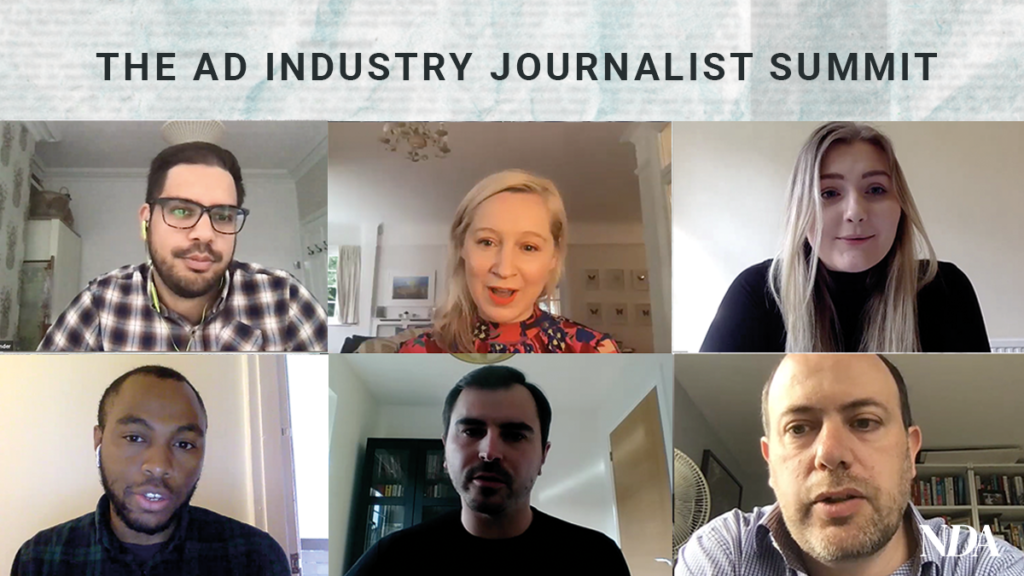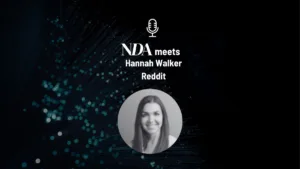The NDA Journalism in the Marketing and Ad Industry Roundtable Summit brought together our industry’s leading journalists to discuss the vital role journalism plays in both supporting and holding to account our industry. We’ll be running a series of articles over the next week generated by the debate.
Journalism matters, perhaps now more than ever. But there is another evolving trend that today’s media, marketing and advertising press is exploring and elevating – and that is the power of community.
With support from Teads, New Digital Age invited Digiday Brands Editor Seb Joseph, Creative Brief’s Editorial Director Nicola Kemp, Campaign Editor-In-Chief Gideon Spanier, The Drum’s Head of Content, Cameron Clarke and Mediatel News’s News Editor Michaela Jefferson to discuss the state of play today.
The Drum recently announced a move towards providing “solutions” to readers. Clarke says that while news reporting is still important to the title, there is opportunity through journalism to more broadly support its readers too.
From commentary to community: building reader-first solutions
“For people to support, and therefore sustain, what we’re doing they must derive real value from what we produce. [They need to know] that it’s going to help them run their businesses day to day and navigate all the challenges that are ahead of them,” he says.
Joseph views the use of digital forums as a valuable source for reactions to initiatives and announcements, not least around diversity and inclusivity, a topic Joseph is driving forward alongside Kemp through the formation of DICE, an organisation set up to support the industry’s inclusion within its events.
“WhatsApp groups are increasingly becoming a good source of ideas for potential stories and just more as importantly, making sure that, for me as a reporter, I am in tune with readers and the issues that are important to them,” he explains, adding that making the industry more self-aware through reporting in order to “push them” to do better in various issues another valuable element of the work carried out by journalists.
For Kemp, now is the time to enact change and build for the better. She sees the current disconnect of society and business as a period when “collective community” is necessary, however she also sees change taking place in the discovery and sharing of content – citing her own involvement in WhatsApp groups where insights are shared by people in need of answers.
Community journalism is more important than ever
“I’ve always loved community journalism and that’s actually more important at the moment, because it’s really easy to feel the challenges that you face are just faced by you. And so, more than ever, we need support from outside of our companies and media brands have a role to play in that, particularly in the creative industries,” says Kemp. “Even in journalism, even within competing titles, there is and has always been a sense of mutual support, and that’s just as important for the industries as a whole.”
She continues to explain how journalism should have a legacy of celebrating and showcasing new talent, rather than relying on a well-worn rolodex of established ‘names.
“Especially during this pandemic, there is a role for publications to champion new talent and new voices,” she states before highlighting the continued need for more people outside of the white male demographic sharing their views.
“The role for elevating new talent is not just to put names on a list and thinking that is the job done, it’s deciding how you are making space for new voices who might need help having their work shaped or with training. I’ve found in trying to make panels more diverse, you have to take more time with people who have never been on a panel before… so there’s almost a bigger role for all publications to elevate new talent- not just in a special issue or because they are a specific age, but constantly.”
Kemp cites how the trade titles claim to reflect the industry as another element to be considered, for example the use of pictures of male leaders in stories or across newsletters, and says that the editor must take a role in taking responsibility for “changing the narrative” which she believes is happening within titles.
“It takes time, it takes money, it takes investment and it takes a little less speed which can be difficult in a breaking news environment,” she continues, adding that having since left her previous news role, she has “a lot more space with which to have more consideration with that framing.”
Beyond the bubble – the need to be inclusive, reflective and proactive
Another issue is bursting the London-centric bubble of much media commentary, which – particularly with the move towards more flexible workforces connecting virtually – must be addressed.
The Drum began as a Scotland-focused title before expanding into the regions of Britain and later internationally, and Cameron highlights his roots writing for the publication from its Manchester office where he would regularly hear from the industry outside of London that it largely felt ignored by the trade press.
“There are lots of factors behind this. The diversity issue is a huge one and geography is another. We have got a crucial role to play and the best way to tackle this problem and to encourage a broader range of voices is to give them that platform in the first place… we don’t need to wait for a 30 under 30 list to do that.
We need a much greater range of voices in our stories day to day,” explains Clarke, who adds that one problem journalists face in tackling the issue is a reluctance by businesses themselves to put forward new voices.
“We all have to go and find those contacts ourselves, we can’t wait for them to fall into our inbox because the biggest companies in our industry will tend to put the same middle-aged male chief executive forward time-and-time again.
“It’s on us to give a broader range of people that opportunity and that is something we are very conscious of and something we will try really hard to do in our coverage moving forward,” he concludes.









